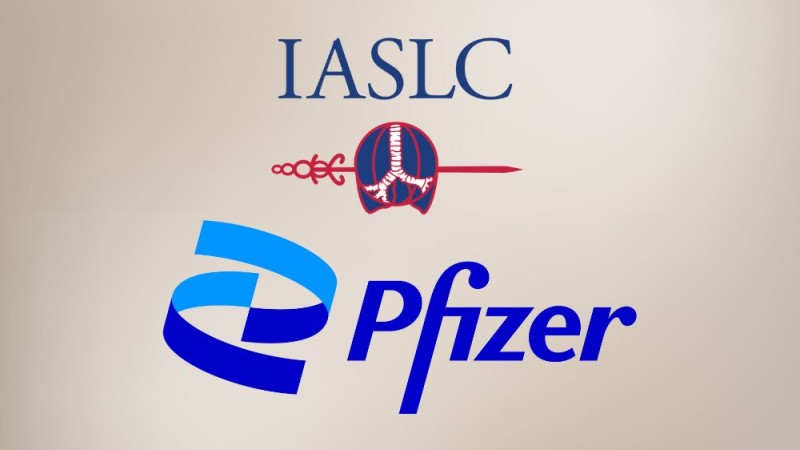
2025 IASLC & PFIZER HOPE QI GRANTS
The IASLC and Pfizer collaborated to support independent quality improvement grants aimed at eliminating regional disparities in health care and improving equity of care for patients with lung cancer in China.
A total of 25 submissions were received, of which 21 grants were deemed within scope and forwarded for review. A panel of nine experts, both from China and abroad, was invited to conduct a thorough evaluation of these 21 in-scope submissions. Under the leadership of Prof. Zhou, the expert review panel (ERP) carried out meticulous assessments and in-depth discussions, ultimately selecting six grants for approval.
IASLC and Pfizer Announce HOPE Project Grant Recipients to Advance Lung Cancer Care in China
October 2025 – The International Association for the Study of Lung Cancer (IASLC), in partnership with Pfizer, is proud to announce the recipients of the Healthcare Optimization and Patient Equity for Lung Cancer in China ("HOPE") Grants. This new initiative supports independent quality improvement (QI) projects aimed at reducing regional disparities and improving equity of care for lung cancer patients in China.
According to Angelo Carter, International Medical Grant Lead, Pfizer, "We aim not only to educate but also to benefit more patients through practical actions. The collaboration between Pfizer and the IASLC has set a precedent in the field of lung cancer in China, and we look forward to continuing to lead future initiatives."
A highly competitive application pool was reviewed by a nine-member international expert panel led by Prof. Caicun Zhou, MD, PhD, IASLC President, who noted, "We've identified challenges and gaps … and while we cannot solve any of these alone, together we can solve problems, close gaps, share resources and care for our NSCLC patients!"
Six projects have been selected for 24 months of funding:
- Guangdong Respiratory and Health Association – A Quality Improvement Study on ALK-Positive NSCLC Diagnosis and Treatment Empowered by Intelligent Technology and Shared Decision-Making, led by Xiaohong Xie, MD. Developing an AI-powered system to improve care for ALK-positive NSCLC patients in China. The platform will support shared decision-making, provide clinical reminders to primary care doctors, and create an intelligent patient management system that tracks side effects and issues alerts. Piloted in 12 hospitals, the project aims to make treatment more consistent, patient-centered, and equitable.
- China Anti-Cancer Association – Address Healthcare Disparities and Ensure Equitable Standardized Lung Cancer Care in China QI Program, led by Fei Zhou, MD, Ph.D. Addressing gaps in guideline adherence and physician training, this project will develop a national cultivation program for young doctors. By standardizing practice, improving diagnosis and treatment proficiency, and reducing regional disparities, it seeks to enhance healthcare equity and long-term outcomes for NSCLC patients across China.
- Nanjing University – Artificial Intelligence Assists Quality Improvement in the Diagnosis and Treatment of ALK-Positive NSCLC, led by Tangfeng Lv, MD, Ph.D. Integrating multidimensional data (imaging, pathology, biomarkers, demographics) into an AI-driven model to improve diagnosis, personalize treatments, and monitor therapeutic efficacy for ALK-positive NSCLC. This approach aims to advance precision medicine and provide real-time clinical support for both physicians and patients.
- China Anti-Cancer Association – Precise-III NSCLC QI Program, led by Professor Zhengfei Zhu, MD. Launching the PRECISE-III Quality Improvement Program to standardize care for stage III NSCLC across China. The initiative will develop practical clinical pathways, expand education for healthcare providers, and center the patient journey to ensure more consistent, high-quality, and hopeful outcomes for patients nationwide.
- Beijing Association of Oncology – Establishing, Implementing, and Evaluating Hierarchical Multidisciplinary Team (MDT) Standards for Lung Cancer in China, led by Professor Jie Wang, MD. Creating China's first hierarchical Multidisciplinary Team (MDT) standards to bring team-based cancer care beyond major hospitals and into provincial and primary care centers. The project will produce standardized tools, checklists, and guidelines, ensuring that MDT-based care reaches more patients, potentially influencing national hospital quality policies.
- Fujian Social Services Association of Medical Staff – Plan-Do-Study-Act Quality Improvement Project for Lung Cancer in China, led by Bin Zheng, MD. Introducing a Plan-Do-Study-Act (PDSA) cycle to improve the diagnosis and treatment of lung cancer. Piloted in one province, the project trains doctors to deliver more consistent, effective care. If successful, it could scale nationally, serving as a model for improving detection and standardized care across China.
These initiatives aim to improve patient outcomes, strengthen healthcare equity, empower physicians and patients, and develop scalable models that can inform national cancer care policy.
This marks the first HOPE Grant collaboration between IASLC and Pfizer, reflecting a shared commitment to advance cancer prevention, enhance treatments, and reduce the burden of care in China.
Project Description:
Unequal adherence to clinical guidelines, uneven regional development, and inconsistent proficiency among young physicians contributed to health care inequities for NSCLC in China, particularly those causing variations in patient care and variations across health care systems. In order to close these gaps, the China Anti-Cancer Association plans to launch this young physicians cultivation program, including polynomial quality improvement approaches to:
- Improve guideline adherence among young physicians.
- Improve healthcare equity and clinical outcomes for lung cancer patients nationwide.
- Counterbalance the clinical diagnosis/treatment and research inconsistent proficiency of young physicians. Ultimately, this effort seeks to deliver long-term benefits to patients by optimizing the precision diagnosis and treatment journey for non-small cell lung cancer (NSCLC) patients across various levels of medical centers in China, and advancing long-term public health benefits.
Project Description: When Artificial Intelligence (AI) Meets Cancer Treatment
What are we doing?
This is a research project that aims to use Artificial Intelligence (AI) to improve the quality of diagnosis and treatment for patients with ALK-positive non-small cell lung cancer in China. Thanks to medical advancements, this type of cancer is increasingly becoming a manageable chronic condition, making the long-term quality of life for patients a new focus. However, there are several challenges in current medical practice:
- The model of doctors and patients making decisions together ("shared decision-making") is not yet common in China when facing complex treatment options.
- Doctors in primary care or local hospitals may lack sufficient experience and knowledge to manage the complex side effects of new-generation targeted therapies.
- There are disparities in medical resources and service quality across different regions.
The core of this project is to explore how AI technology can be used to address these challenges.
How will AI help?
We will develop and apply an "AI-Powered Support System" with three main functions:
- Empowering Shared Decision-Making: The AI tools will provide patients with personalized and easy-to-understand health information to help them grasp their treatment options. At the same time, it will assist doctors in fostering more effective communication with patients to jointly choose the most suitable treatment path.
- Enhancing Primary Care Capabilities: The system will provide "smart reminders" and decision support based on the latest guidelines for doctors, especially those in primary care. For instance, when managing complex drug side effects, the system can offer risk alerts and management suggestions.
- Building an Intelligent Patient Management System: By integrating clinical data with information reported by patients themselves, the AI system can dynamically monitor a patient's health status and issue alerts for potential risks (like severe side effects), enabling early intervention.
Why is this project important?
This 24-month project will be piloted in 12 hospitals across China. It's about more than just developing a new tool; it's about exploring and validating a new model for cancer care that is smarter, more efficient, and more patient-centered. If successful, its findings could provide valuable evidence for improving the long-term management and quality of life for cancer patients in China and potentially around the world.
Project Description:
This project lies in integrating AI technology to develop a data-driven model for ALK-positive NSCLC management. This model leverages multidimensional data (e.g., clinical demographics, imaging, pathology, and tumor biomarkers) to improve diagnostic accuracy, personalize treatment strategies, and enable real-time monitoring of therapeutic efficacy and adverse events.
Project Description:
Working Towards Better Care for Stage III Lung Cancer in China
Being diagnosed with stage III non-small cell lung cancer (NSCLC) can feel overwhelming. This stage of lung cancer is complex and varies greatly from person to person, meaning treatment needs to be carefully tailored. Unfortunately, long-term outcomes for this stage remain challenging, and translating the best known treatments into everyday practice across China can be difficult.
A significant challenge is that access to highly specialized knowledge and consistent treatment can vary between different regions and hospitals. This can sometimes lead to differences in accurate detection, optimal treatment decisions, and coordinated, long-term patient management, particularly in rural areas or lower-volume medical centers.
To help address this, the China Anti-Cancer Association (CACA) is launching a quality improvement initiative called the PRECISE-III NSCLC QI Program.
The core goal of this project is to improve and standardize the quality of care for stage III NSCLC patients across China. It‘s based on a thorough analysis of the current real-world situation. The program focuses not just on the doctor’s perspective, but also deeply considers the patient‘s journey and experience.
The project plans to develop clear, practical clinical pathways based on scientific analysis and real-case learning. A key component will be comprehensive education for healthcare professionals. This aims to enhance awareness, understanding, and the consistent application of standardized management for stage III NSCLC, ultimately aiming to bring more hope and better outcomes to patients.
This initiative represents a hopeful step towards ensuring that more patients across China can receive consistent, high-quality, and patient-centered care for stage III lung cancer.
Project Description:
The Hierarchical MDT Project for Lung Cancer in China
Lung cancer is the top cause of cancer deaths in China. The Multidisciplinary Team (MDT) model improves outcomes and is guideline-recommended, but it's only common in top hospitals, with most local/primary hospitals lacking access. China also has no MDT standards for different hospital levels and few evaluations for MDT implementation.
This project will develop a "hierarchical MDT standard" fitting provincial, local, and primary hospitals. It has four phases: developing standards, implementing in pilot hospitals, evaluating and refining/promoting nationwide.
Key outputs include China's first hierarchical MDT procedures for lung cancer, practical tools (checklists, guides), and proof of effectiveness. It will also facilitate to include these standards in national hospital quality policies, benefiting China's ~800,000 annual new lung cancer patients.
Project Description:
Dr. Bin Zheng is leading a lung cancer quality improvement project in China aimed at enhancing standardized diagnosis and treatment of this disease. This pilot program is introducing a Plan-Do-Study-Act (PDSA) methodology – a step-by-step improvement cycle – to make lung cancer care more effective and consistent. Currently being piloted in one province, the project helps doctors catch lung cancer earlier and provide better, more consistent treatment. This focus is crucial because lung cancer is the leading cause of cancer deaths in China, so finding the disease early and treating it properly can greatly improve patient outcomes. If successful, the new approach could serve as a model for improving lung cancer care across the country, potentially guiding a national expansion of these improvements.
Special Thanks to Expert Review Panel
The Expert Review Panel selects the award recipients for the HOPE program. We are deeply grateful for the invaluable expertise and dedication of ERP Chair Prof. Caicun Zhou, ERP members Prof. Natasha Leighl, Dr. Jann Balmer, Prof. Wen-zhao Zhong, Prof. Min Fan, Prof. Chengzhi Zhou, Prof. Dongmei Lin, Prof. Yong Song, Xiaozhen Jing. Your profound contributions have been instrumental in advancing this significant and meaningful project, and we truly appreciate your unwavering commitment to its success.







